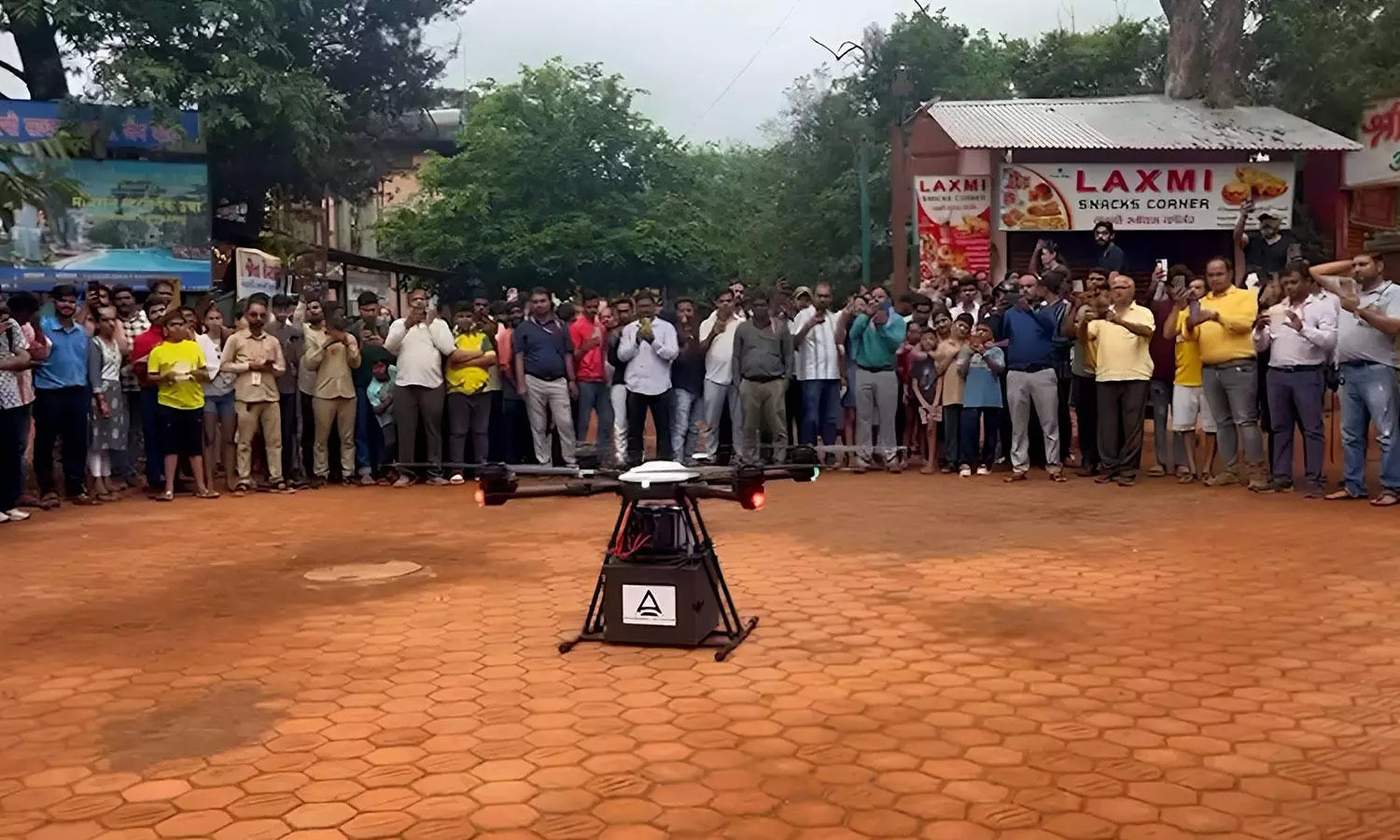India Post flies a postal bag by drone from Karjat to Matheran in 15 mins
For centuries, pigeons carried handwritten notes across the skies. Now, India Post revives that spirit—using drones to deliver mail where roads can't.

For centuries, handwritten letters were entrusted to pigeons—winged messengers of human connection. Today, India Post is reviving that legacy in a futuristic form: drones that carry mail over mountains, where roads falter and time slows.
In a modern revival of pigeon post, the world’s largest postal network has launched drone deliveries between remote post offices—signaling a potential transformation in India’s public logistics. On May 16, 2025, Amber Wings, an IIT Madras–incubated brand under Ubifly Technologies, successfully delivered a postal bag from Karjat to Matheran—a hill station in Maharashtra. This was a pilot test and there have been no official updates on a commercial rollout yet.
Karjat (elevation: 194 meters) and Matheran (800 meters) are only 9.5 km apart by air, but over 25 km apart by road—a twisting uphill journey that can take up to 90 minutes, especially during monsoons. In this operation, an Amber Wings drone—a brand under Ubifly Technologies—carried a 9.8 kg postal bag from Karjat post office to Matheran post office in just 15 minutes, and returned with a 9.1 kg package.
“This isn't just incremental improvement; this is a paradigm shift. Amber Wings isn't just participating in the future of logistics; we are aggressively defining it. Faster, smarter, undeniable,” stated Amber Wings in an official LinkedIn post.
What stood out, however, was the unusually swift turnaround for India Post, a government institution. According to sources, Amber Wings senior leaders visited the India Post office on May 2, and within just two weeks, the pilot test was conducted. Given that government-led projects typically face significant delays due to procedural and approval bottlenecks, this rapid execution was unexpected and uncharacteristic of an institution like India Post.
This isn’t just about drones dropping parcels at your doorstep. Instead, the focus is on boosting connectivity between postal hubs in hard-to-reach areas—regions where terrain, weather, and infrastructure challenges hamper traditional delivery. Drones are being positioned as scalable, mid-mile logistics solutions, not just last-mile delivery partners.
India Post’s earlier drone milestone
This isn’t India Post’s first brush with drones. In 2022, Gurugram-based TechEagle partnered with India Post to deliver mail across the Kutch region of Gujarat. Their hybrid-electric VertiplaneX3 covered a 46 km route in under 30 minutes, carrying a 3 kg payload—five times faster than ground transport.
These successful trials across states underline the potential of drones as reliable, fast, and sustainable alternatives for critical public services.
Two wings of Ubifly: Cargo and commuters in the sky
While Amber Wings is focused on developing cargo eVTOLs for logistics, agriculture, and aerial imaging, another brand under the Ubifly Technologies banner is charting a different path—through the crowded skies of urban India.
The ePlane Company, also incubated at IIT Madras, is building electric vertical takeoff and landing (eVTOL) aircraft designed not for parcels, but for people. Targeted at mid-mile urban commuting, the aircraft are compact enough to take off and land in tight city spaces, making them ideal for routes such as from metro stations to business hubs. With a range of 110 km and speeds up to 210 km/h, these air taxis aim to cut city commute times by up to 85%, at just 1.7 times the fare of an Uber ride.
Founded by Professor Satya Chakravarthy, a veteran aerospace engineer at IIT Madras and co-founder of startups like Agnikul and GalaxEye, ePlane has developed a unique “lift-plus-cruise” configuration. This combines winged architecture with vertical rotors to enable safe transitions between vertical takeoff and forward flight. Unlike bulkier eVTOLs with 12–16-meter wingspans, ePlane’s compact 8-meter wings allow for multiple short trips—up to 60 per day—on a single charge.
The startup has recently gained serious traction. It became the first Indian private firm to receive Design Organisation Approval (DoA) from the Directorate General of Civil Aviation (DGCA) for an electric aircraft. It has also secured type certification and is preparing for flight tests in mid-2025.
In November 2024, ePlane raised a $14 million Series B funding round co-led by Speciale Invest and Antares Ventures, valuing the startup at $46 million post-money. Adding to its momentum, ePlane signed a non-binding agreement in February 2025 to supply 788 electric air ambulances in a deal valued at over $1 billion with ICATT(International Critical Care Air Transfer Team)—a move that could revolutionise emergency healthcare delivery in district hospitals across India.
Now, the company is reportedly planning to raise $30–50 million in a Series C round to manufacture three prototypes by 2026 and gear up for its first commercial launch.
As India’s government shows growing interest in urban air mobility—Prime Minister Narendra Modi recently said air taxis will soon be a reality—the company is aiming to commercialise its air taxis by 2026. For ePlane, what’s taking off in India today may soon be flying across global skies—from Southeast Asia to Europe.
Skybound future: India’s drone moment arrives
India Post’s drone logistics program, combined with innovations from startups like ePlane and TechEagle, marks a pivotal shift in the country’s delivery and mobility landscape.
Drones offer speed, sustainability, and resilience—crucial advantages in a climate-impacted world. Their ability to operate in monsoons, over mountains, or amid disaster zones positions them as future-ready logistics tools. Most are powered by electricity, and can be integrated with renewable sources to shrink carbon footprints.
Challenges remain: airspace management, public acceptance, payload limits, and regulatory clarity are still evolving. But with government support and rapid tech advancement, what began as a 9.8 kg postal bag flying over the Western Ghats could scale into a national drone grid—delivering everything from medicines to groceries, rewriting India’s delivery playbook, one silent flight at a time.
- India Postdrone deliveryAmber WingsUbifly TechnologiesKarjat to MatheranePlane CompanyIIT Madras startupdrone logisticspostal drone IndiaeVTOL Indiaair taxi Indiacargo dronesIndia drone pilotTechEagleICATTdrone innovation Indiaurban air mobilityelectric aircraft Indiadrone mail serviceIndia Post drone trial

Rajarshi Chatterjee
Rajarshi is an editorial professional with nearly a decade of experience in writing content for print and online publications. He has hosted numerous entrepreneurship events and moderated sessions at various events, including Flower Logistics Africa. He has previously worked with reputable organizations such as YourStory, YouGov, Inc42, and Sportskeeda and has catered to a diverse range of clients, including Google, PhonePe, the Karnataka State Government, and the Rajasthan State Government. In addition to writing, he enjoys watching films, cooking, and exploring offbeat locations in India.


